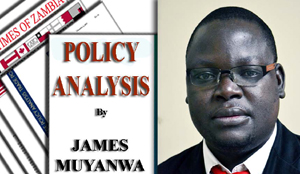 THE depreciation of the Kwacha has taken up huge spaces in both print and electronic media in the last few weeks.
THE depreciation of the Kwacha has taken up huge spaces in both print and electronic media in the last few weeks.
Lamentations have been made on the matter with some players in the economy indicating how they are losing out as the result of the fall of the local currency.
Externally, the depreciation of the Kwacha has been caused by the strengthening value of the United States (US) dollar and the falling prices of Zambia’s main export product, copper, on the international market.
For instance last week, the US dollar broke a record of rising in value at its fastest pace in 40 years, according to the CNN.
To Zambia the strengthening of the dollar means that much more of the Kwacha is being spent in exchange for the limited amounts of dollar.
The US dollar has defied all odds and outpaced all the major currencies including the Euro and the British Pound in terms of the growth rate since the 2008 economic global economic meltdown.
Of course the Kwacha has also been severely battered by the dollar together with other currencies from the region, like the South African Rand.
For Zambia, that has been worsened by limited supply of the dollar on the local market as the result of the reduction in the non-traditional exports (NTEs) for Africa’s second largest copper producer.
Constant dependence on the imports of some goods into the country is adding salt to the injured local economy in that the little dollar available has to be used in these transactions, further widening the gap between the value of the dollar and the kwacha.
In any situation, no matter how grave, however, there are always winners and this case is no exception.
Yes, some export-oriented entities are ideally supposed to be gaining from the scenario, provided they are not heavily dependent on imports.
Like Finance Minister Alexander Chikwanda recently indicated some organisations are recording a windfall in terms of their returns from their export in that for fixed prices of the exported commodities, in dollar of course, they are getting more Kwacha equivalent.
“Companies that are not import dependent in terms of inputs but export various commodities, whether agricultural products or minerals, will enjoy some windfall with the falling kwacha, which pushes up their proceeds and boosts their balance sheets.
“For them, those revenues, which have their origins in taxes of international trade, may go up,” Mr Chikwanda told Parliament on March 30 2015.
From that comment, it is worthy to note that the export of copper, however, does not result in any windfall despite the falling Kwacha, because the international prices of that metal itself are plummeting.
Generally, however, the fall in the value of the dear Kwacha should make Zambia’s export more competitive, which in the normal circumstances should lead to the rise in the demand for exports.
This increased demand for exports should be able to trigger job creation locally and raise the aggregate demand for local goods and services due to the rise in the number of people with disposable incomes.
Ideally if exports became more competitive, more of the products will be sold as the result and if we assume that demand for exports is relatively elastic, there will be an improvement in the current account status.
For Zambia, the situation may not work out as it should be because of the absence of certain factors as well as the presence of other factors which together work counter to the splendid performance of the economy.
The absent factors include a robust local manufacturing base as well as the NTE products which should be able to help lift the country to higher economic level.
In short even if this is the best time to exports our goods, given the value of the Kwacha; we cannot take advantages of the situation because we have no products to export.
The continued dependence on import, current inflationary growth and others make up the present factors which lead to the same adverse result.
Traders, farmers and employees whose incomes are pegged in US dollar are among the categories of people benefiting from the falling value of the Kwacha.
This is provided the prices, in dollar, were fixed well in advance even before the current kwacha rates.
What it means is that, for instance if somebody’s monthly salary is pegged at $2000, when the exchange rate was K6 per dollar he was getting K12,000 but now when the rate is above K7 per dollar he will get at least K14,000 for the same amount of work.
Similarly for exporters and other income earners whose transactions are quoted in dollar.






